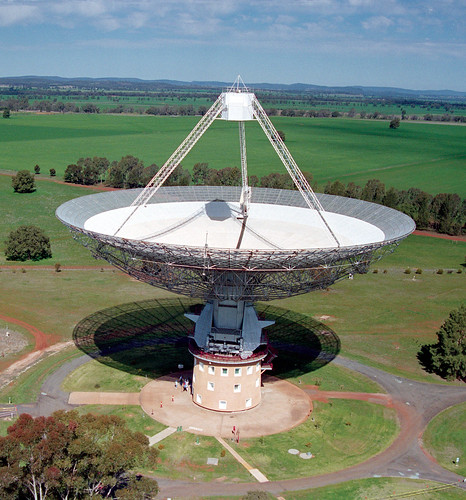Big Bang Monday: Intergalactic Radio Bursts

Crackerjack job, mates!
A team of scientist have found radio burst from billions of light years away — beyond the Milky Way galaxy. Billions.
Australia’s Commonwealth Scientific and Industrial Research Organisation had this to say:
CSIRO’s Parkes radio telescope in eastern Australia has detected mysterious ‘flashes’ of radio energy from the distant Universe that may open up a whole new area of astrophysics. The surprising finding, made by a team of scientists from ten institutions in Australia, the USA, UK, Germany and Italy, is published in today’s issue of the journal Science.
“Staggeringly, we estimate there could be one of these flashes going off every ten seconds somewhere in the sky,” said research team member Dr Simon Johnston, Head of Astrophysics at CSIRO Astronomy and Space Science.
Four flashes were detected, each from a different direction and each lasting for only a millisecond (a thousandth of a second).
The characteristics of the radio signal — how it is ‘smeared out’ in frequency from travelling through space — indicate that the flashes came from up to 11 billion light-years away.
The Parkes Observatory’s 64-meter radio telescope did the job.
Interested? Here’s the abstract from Science:
Searches for transient astrophysical sources often reveal unexpected classes of objects that are useful physical laboratories. In a recent survey for pulsars and fast transients, we have uncovered four millisecond-duration radio transients all more than 40° from the Galactic plane. The bursts’ properties indicate that they are of celestial rather than terrestrial origin. Host galaxy and intergalactic medium models suggest that they have cosmological redshifts of 0.5 to 1 and distances of up to 3 gigaparsecs. No temporally coincident x- or gamma-ray signature was identified in association with the bursts. Characterization of the source population and identification of host galaxies offers an opportunity to determine the baryonic content of the universe.
Far out, man.
Tags: csiro, e.t., parkes observatory, radio telescope
